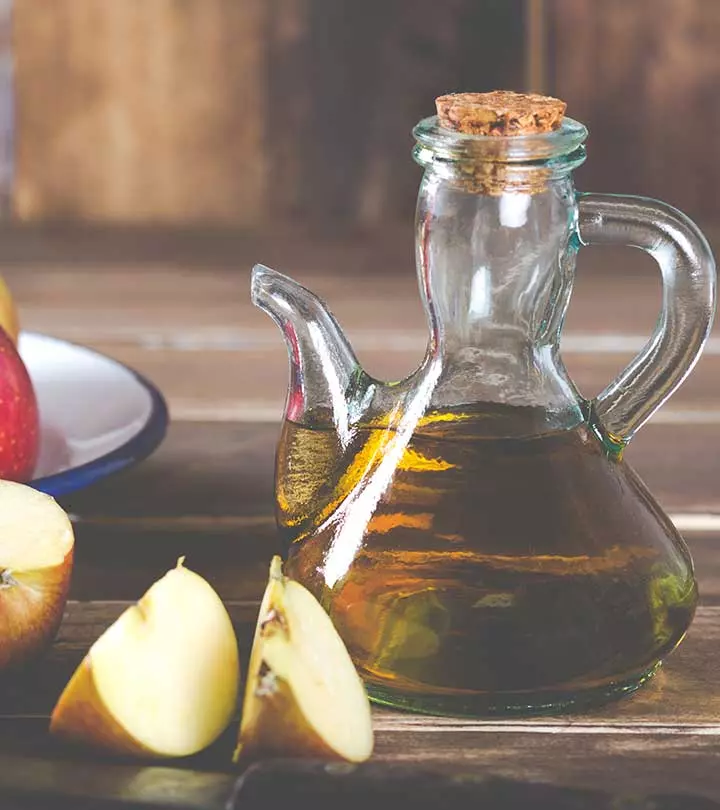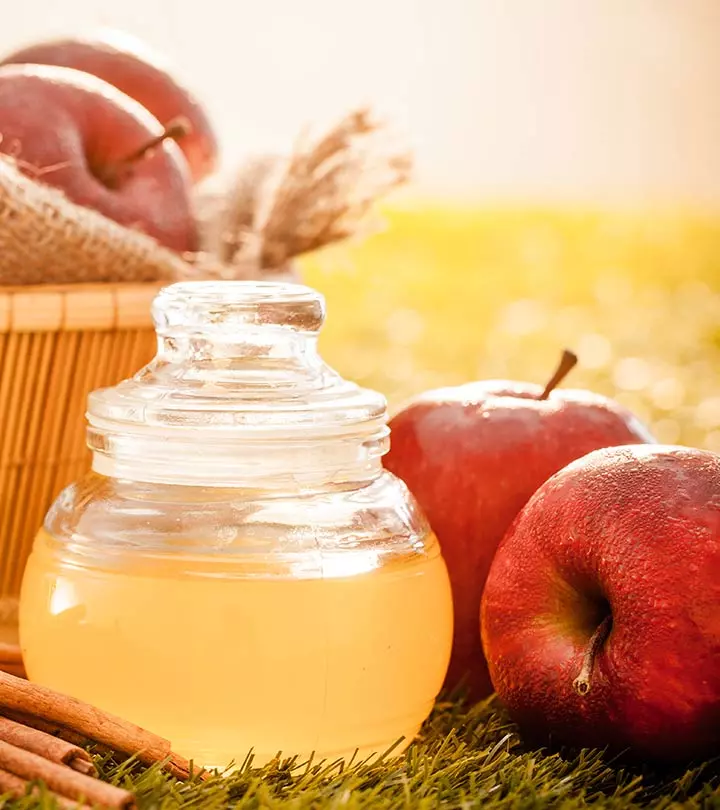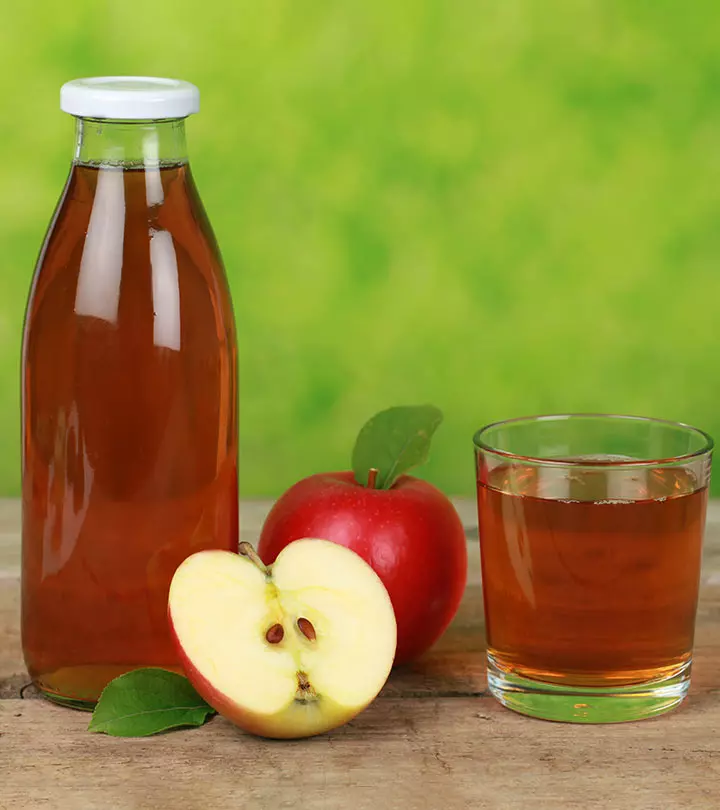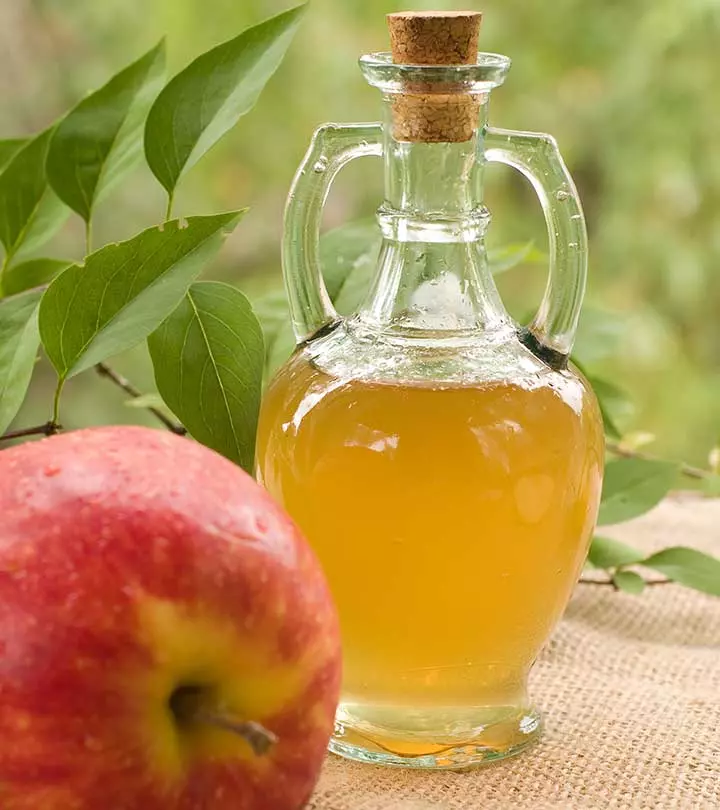Apple Cider Vinegar: Health Benefits, Dosage, & Side Effects
Many claim that ACV offers important benefits, but what does science say?

Image: Shutterstock
The benefits of apple cider vinegar make it worth adding to your diet. Traditionally, apple cider vinegar (ACV) is mainly used for digestive issues, skin problems, warts, dandruff, lice, and sore throats. ACV can also be used as a dietary supplement to promote weight loss, lower blood pressure, and manage sugar and cholesterol levels.
The health benefits of ACV may be attributed to its acetic acid, phenols, and probiotic bacteria. This article discusses the benefits of ACV, recommended dosage, and any potential side effects. Take a look.
In This Article
What Is Apple Cider Vinegar?
Apple cider vinegar (ACV) is made by fermenting apple juice (Malus domestica). The fermented juice (or cider) contains ethyl alcohol that is converted to acetic acid by a microbe called Acetobacter (1).
The unpasteurized or organic ACV contains microbes. These microbes, such as yeast and bacteria, are also collectively known as the “mother” and are rich in enzymes and proteins. They give ACV its characteristic cloudy appearance and provide probiotic benefits to the body.
ACV also contains minerals, vitamins, polyphenols, and lactic, citric, malic, and acetic acids (2). A study reported that gallic acid and chlorogenic acid were dominant phenolic compounds in mother of apple vinegar (3). Acetic acid (5%) is the active compound of ACV. It is also responsible for the characteristic strong smell and sour taste. It may be responsible for the many purported health benefits (1).
Anecdotal evidence suggests many claims of ACV. Let us explore the scientific research behind it.
What Are The Benefits Of Apple Cider Vinegar?
1. May Have Antimicrobial Properties
Traditionally, ACV was used as a food preservative and disinfectant (4). It could help in preventing food spoilage as it prevents the growth of bacteria, such as Escherichia coli (1), (5).
A study reported that ACV showed antifungal properties against the Candida fungus (6). Another case report used ACV for treating vaginal candidiasis in a woman (7). Apple cider vinegar does have antimicrobial properties. However, more studies are needed to understand its therapeutic applications.
2. May Improve Digestion
The “mother” in the ACV is a probiotic. Probiotics help in improving the gut microbial population (8). There is scientific evidence that consuming fermented foods can help in keeping the gut healthy (9). These good bacteria help provide nutrients to the body and also prevent the growth of pathogens. Probiotic bacteria lower inflammation, boost immunity, and may also improve mental health (10), (11).
ACV contains acetic acid. Animal studies have reported that acetic acid has the potential to be used as a treatment for ulcerative colitis (12).
There is insufficient information to determine if ACV helps in treating acid reflux. A study highlighted a gap between anecdotal claims and empirical evidence regarding the use of ACV for treating esophageal symptoms (13).
3. May Promote Weight loss
The anti-inflammatory and anti-adiposity properties of ACV may prevent obesity and obesity-related cardiac complications induced by a high-fat diet. This was found in rat studies (14). Another study on rats fed with a high-fat diet reported that ACV may reduce the risk of obesity due to its antioxidant activity (15).
Results from animal studies have concluded that ACV has significant anti-hyperlipidemic activity in rats with hyperlipidemia (high cholesterol) (16). Weight loss was observed in rats treated with ACV. Their lipid parameters were also consistent (16).
In other studies, test subjects who consumed ACV for eight weeks had lower levels of unhealthy fats or lipids (17).
Vinegar has also been effective against obesity, according to a Japanese study (18). The results of the study indicated that vinegar intake reduced body weight (weight loss), body fat mass, visceral fat and serum triglyceride levels in obese Japanese subjects (18).
In another study, vinegar also increased satiety after a bread meal in healthy subjects. This may help in combating obesity (19). Another study states that using vinegar may help reduce postprandial glycemia (20).
However, the scientific community is divided over the effectiveness of ACV helping in weight loss. Hence, we need more studies in this regard.
4. May Improve Heart Health
Animal studies have revealed that vinegar can reduce blood triglycerides and cholesterol (21). Dietary acetic acid reduced serum total cholesterol and triacylglycerol in rats fed with high cholesterol diets (21),(22), (23).
A study analyzed the effect of vinegar on hypercholesterolemic rabbits (22). Vinegar lowered most of the biochemical parameters, like cholesterol, C-reactive protein (CRP), and apolipoprotein A (ApoA), that may increase the risk of cardiovascular disorders, like atherosclerosis (22).
Hypertension or high blood pressure may lead to heart problems. Vinegar was also found to reduce blood pressure in rats (24), (25). These preliminary studies on animals need to be confirmed in humans.
5. May Help Manage Diabetes
Studies on diabetic mice have revealed that ACV can lower blood glucose levels (26). In healthy subjects, ACV could lower blood sugar levels and insulin response after a meal (20). However, in subjects with diabetes, it does not delay gastric emptying (27).
Most studies claim that vinegar lowers blood glucose levels (28), (29), (30). However, other studies state that vinegar could be more effective in regulating blood sugar levels in healthy individuals than those with diabetes (31).
6. May Boost Skin Health
Apple cider vinegar contains alpha-hydroxy acids, including lactic and malic acids. These acids have been used extensively in skin care (32).
Lactic acid improves skin hydration (32), (33). It also gently exfoliates skin (sloughs off dead skin layers), improves skin texture, and helps reduce fine lines by boosting cell renewal (34), (35). Lactic acid is also reported to treat dark circles and hyperpigmentation when combined with trichloroacetic acid (36).
Studies reported that vinegar in a cream base improves atopic dermatitis in mice (37). Anecdotal evidence suggests that ACV may help relieve symptoms of psoriasis, including itching and scaly patches. However, there is no scientific data to back this claim.
ACV has antimicrobial activity. It may help in treating acne-prone skin. However, more research is warranted in this area.
The topical application of ACV may cause skin burns and skin irritation (38). Hence, practice caution.
7. May Improve Immunity
ACV is rich in antioxidants and phenols. These compounds help in scavenging toxins from cells produced during oxidative stress (39). Many folk remedies use ACV to treat inflammation related diseases, like multiple sclerosis, ankylosing spondylitis, and rheumatoid arthritis.
However, the scientific evidence in this aspect is scarce. On the contrary, a study claimed ACV to be ineffective as an anti-arthritic and anti-inflammatory agent in rats with adjuvant arthritis (40).
8. May Help Treat Polycystic Ovarian Syndrome (PCOS) Symptoms
A study investigated the effect of ACV with the mother (the beneficial yeast and bacteria) on reproductive hormones. ACV reduced the levels of estrogen and testosterone but increased progesterone levels in Wistar rats (41).
Research suggests that the intake of ACV can help with regulating ovulatory function in women with polycystic ovary syndrome (42). It was also reported that consuming 15 g of apple vinegar daily for 90 to 110 days helped improve insulin sensitivity and restored regular periods (42).
These are the potential benefits of apple cider vinegar. Some of them are yet to be confirmed in humans. In the following section, we will look at the dosage of ACV and the ways to use it.
Dosage And How To Use
Anecdotal remedies suggest ingesting 1 teaspoon to 2 tablespoons (10–30 ml) of ACV per day. It can be mixed with water and taken or can be added to salad dressings and marinades. Below, we have discussed ACV recipes targeted for specific health concerns (none of these have been backed by research; consult your doctor before trying any):
Digestion
What You Need
- 15-30 mL ACV
- 1 glass of water
Process
Mix the ACV in water and drink it before meals.
Weight Loss
What You Need
- 15-30 mL ACV
- A few drops of lemon juice
- 1 glass of water
Process
Mix the ACV in water and drink it on an empty stomach early in the morning.
Polycystic Ovarian Syndrome (PCOS)
What You Need
15 mL ACV
Process
Drink one tablespoon of ACV everyday for around 3-6 months.
Hair Rinse
What You Need
- 10 mL ACV
- 1 tablespoon honey
- A few drops of lemon juice
- Water (as needed)
Process
Mix all the ingredients in water and use this as a hair rinse after shampooing. The vinegar smell would vanish gradually.
Skin Toner
What You Need
- 10 mL apple cider vinegar
- 10 mL rose water
- 20 mL water
Process
- Mix all the ingredients in water. Dip a cotton ball in this mixture and dab it evenly on your skin. You can also spritz it on your face. Use diluted ACV as concentrated ACV can cause skin burns or irritation.
- Use a moisturizer after this step.
Mouth Wash
What You Need
- 15 mL apple cider vinegar
- 30 mL water
Process
Use diluted vinegar as a mouthwash. Swirl it around for 20-30 seconds and rinse with water afterwards. This will kill the bacteria in the mouth and keep bad breath at bay.
You can try using ACV in these ways and experience results. However, ACV may also cause side effects in some people.
Apple Cider Vinegar Side Effects
Apple cider vinegar is relatively safe to consume. However, its acidic nature may cause a mild burning sensation in the throat and stomach.
It may cause damage to the tooth enamel and cause dental erosion (43).
In a study, prolonged consumption of ACV had caused hypokalemia (potassium deficiency) in a woman (44).
The topical application of undiluted vinegar can lead to skin burns and irritation (38), (45).
ACV may also cause nausea, acid reflux, burping, flatulence, and irregular bowel movements (46), (47).
Apple cider vinegar’s benefits are gaining popularity worldwide and rightly so. Rich in anti-oxidative phenols, acetic acid, and probiotics, apple cider vinegar not only helps improve your digestive, skin, and hair health but also aids in weight loss and managing your blood cholesterol levels. Apple cider vinegar also helps keep your blood sugar levels in check, helping you to manage diabetes better. It is also popularly used in detoxifying drinks to help you cleanse your body. While it is safe to consume 1-2 teaspoons of apple cider vinegar in drinks or dressings per day, over and prolonged consumption may lead to certain avoidable side effects.
Frequently Asked Questions
Can I drink apple cider vinegar every day?
There have been reports that prolonged intake of ACV may be harmful to the bones as it interferes with calcium absorption. Hence, do not take it every day.
When should you drink apple cider vinegar?
Generally, it is consumed before meals, but it can be taken anytime.
How does apple cider vinegar detox your body?
There is not enough data to support the claim that ACV detoxifies the body. However, it contains antioxidant and anti-inflammatory compounds that may help.
How much weight can you lose with apple cider vinegar in a week?
There are no studies available currently about the parameters involved.
What does apple cider vinegar do for your hair?
It has been suggested that it balances the pH of the scalp and helps remove dandruff.
Does ACV affect urine?
No studies have been done in this aspect.
How many times a day can you drink ACV?
ACV can cause adverse effects like nausea and acid reflux when consumed frequently or in excess. Hence, do not take it more than thrice a week or once a day.
What are the benefits of apple cider vinegar and honey?
Anecdotal remedies suggest that ACV with honey may help with weight loss and improve digestion.
How long does it take to detox with apple cider vinegar?
Home remedies suggest that ACV takes about a week to detox your body. However, there is no scientific proof to back this claim.
Which apple cider vinegar is best for weight loss?
ACV with the mother is suggested to be good for weight loss.
Is apple cider vinegar good for kidney stones?
There is very less research in this regard. Hence, it is important to consult a doctor.
Is it OK to drink apple cider vinegar on an empty stomach?uestion
Yes, you can. But practice caution as it may cause side effects like nausea.
Does apple cider vinegar give you energy?
ACV may help regulate blood sugar levels. This may offer energy.
How do you protect your teeth with apple cider vinegar?
You can have ACV in a diluted form. You can also use a straw to prevent the ACV from damaging the enamel of the teeth.
Does apple cider vinegar make you poop?
Folk remedies recommend ACV as a cure for constipation. However, it is known to cause diarrhea when consumed in excess. There is no concrete research to substantiate its claims.
References
Articles on StyleCraze are backed by verified information from peer-reviewed and academic research papers, reputed organizations, research institutions, and medical associations to ensure accuracy and relevance. Read our editorial policy to learn more.
- Yagnik, Darshna, Vlad Serafin, and Ajit J. Shah. “Antimicrobial activity of apple cider vinegar against Escherichia coli, Staphylococcus aureus and Candida albicans; downregulating cytokine and microbial protein expression.” Scientific reports8.1 (2018): 1-12.
https://www.ncbi.nlm.nih.gov/pmc/articles/PMC5788933/ - Xia, Ting, et al. “Nutrients and bioactive components from vinegar: A fermented and functional food.” Journal of Functional Foods(2019): 103681.
https://www.sciencedirect.com/science/article/pii/S175646461930605X - Aykın, Elif, Nilgün H. Budak, and Zeynep B. Güzel-Seydim. “Bioactive components of mother vinegar.” Journal of the American College of Nutrition34.1 (2015): 80-89.
https://www.tandfonline.com/doi/abs/10.1080/07315724.2014.896230 - BALDAS, Berrin, and ERGİN MURAT ALTUNER. “The antimicrobial activity of apple cider vinegar and grape vinegar, which are used as a traditional surface disinfectant for fruits and vegetables.” Communications Faculty of Sciences University of Ankara Series C Biology27.1 (2018): 1-10.
https://www.researchgate.net/publication/325575469 - Park, Shin Young, Sujin Kang, and Sang-Do Ha. “Antimicrobial effects of vinegar against norovirus and Escherichia coli in the traditional Korean vinegared green laver (Enteromorpha intestinalis) salad during refrigerated storage.” International journal of food microbiology238 (2016): 208-214.
https://pubmed.ncbi.nlm.nih.gov/27665528/ - Mota, Ana Carolina Loureiro Gama, et al. “Antifungal activity of apple cider vinegar on Candida species involved in denture stomatitis.” Journal of Prosthodontics24.4 (2015): 296-302.
https://onlinelibrary.wiley.com/doi/abs/10.1111/jopr.12207 - Ozen, Betul, and Muruvvet Baser. “Vaginal Candidiasis Infection Treated Using Apple Cider Vinegar: A Case Report.” Alternative Therapies in Health & Medicine23.7 (2017).
https://pubmed.ncbi.nlm.nih.gov/29112940/ - Fooks, L. J., and Glenn R. Gibson. “Probiotics as modulators of the gut flora.” British Journal of Nutrition88.S1 (2002): s39-s49.
https://www.cambridge.org/core/journals/british-journal-of-nutrition/article/probiotics-as-modulators-of-the-gut-flora/0ECB99C9BCC4A6217AA70A51471E3BBA - van Hylckama Vlieg, Johan ET, et al. “Impact of microbial transformation of food on health—from fermented foods to fermentation in the gastro-intestinal tract.” Current opinion in biotechnology22.2 (2011): 211-219.
https://www.sciencedirect.com/science/article/abs/pii/S0958166910002363 - Shi, Lye Huey, et al. “Beneficial properties of probiotics.” Tropical life sciences research27.2 (2016): 73.
https://www.ncbi.nlm.nih.gov/pmc/articles/PMC5031164/ - Selhub, Eva M., Alan C. Logan, and Alison C. Bested. “Fermented foods, microbiota, and mental health: ancient practice meets nutritional psychiatry.” Journal of physiological anthropology33.1 (2014): 2.
https://link.springer.com/article/10.1186/1880-6805-33-2 - Shen, Fengge, et al. “Vinegar treatment prevents the development of murine experimental colitis via inhibition of inflammation and apoptosis.” Journal of agricultural and food chemistry64.5 (2016): 1111-1121.
https://pubs.acs.org/doi/full/10.1021/acs.jafc.5b05415 - Ahuja, Amisha, and Nitin K. Ahuja. “Popular Remedies for Esophageal Symptoms: a Critical Appraisal.” Current gastroenterology reports21.8 (2019): 39.
https://link.springer.com/article/10.1007/s11894-019-0707-4 - Bounihi, Abdenour, et al. “Fruit vinegars attenuate cardiac injury via anti-inflammatory and anti-adiposity actions in high-fat diet-induced obese rats.” Pharmaceutical biology55.1 (2017): 43-52.
https://www.tandfonline.com/doi/full/10.1080/13880209.2016.1226369 - Halima, Ben Hmad, et al. “Apple cider vinegar attenuates oxidative stress and reduces the risk of obesity in high-fat-fed male Wistar rats.” Journal of medicinal food21.1 (2018): 70-80.
https://pubmed.ncbi.nlm.nih.gov/29091513/ - Ajaykumar, T. V., et al. “Antihyperlipidemics: effect of apple cider vinegar on lipid profiles.” International Journal of Biological & Pharmaceutical Research 3.8 (2012): 942-945.
https://www.researchgate.net/profile/Ajay_Kumar25/publication/273885296_ANTIHYPERLIPIDEMICS_EFFECT_OF_APPLE_CIDER_VINEGAR_ON_LIPID_PROFILES/links/550f17170cf2ac2905adffe6/ANTIHYPERLIPIDEMICS-EFFECT-OF-APPLE-CIDER-VINEGAR-ON-LIPID-PROFILES.pdf - Beheshti, Zahra, et al. “Influence of apple cider vinegar on blood lipids.” Life Sci J 9.4 (2012): 2431-40.
https://www.researchgate.net/profile/Hamid_Sharif_Nia/publication/260311324_Influence_of_apple_cider_vinegar_on_blood_lipids/links/00b7d530bb6f074e4b000000.pdf - Tomoo KONDO, Mikiya KISHI, Takashi FUSHIMI, Shinobu UGAJIN & Takayuki KAGA (2009) Vinegar Intake Reduces Body Weight, Body Fat Mass, and Serum Triglyceride Levels in Obese Japanese Subjects, Bioscience, Biotechnology, and Biochemistry, 73:8, 1837-1843.
https://www.tandfonline.com/doi/pdf/10.1271/bbb.90231 - Östman, Elin, et al. “Vinegar supplementation lowers glucose and insulin responses and increases satiety after a bread meal in healthy subjects.” European journal of clinical nutrition59.9 (2005): 983.
https://www.nature.com/articles/1602197 - Johnston, Carol S., and Amanda J. Buller. “Vinegar and peanut products as complementary foods to reduce postprandial glycemia.” Journal of the American Dietetic Association105.12 (2005): 1939-1942.
https://pubmed.ncbi.nlm.nih.gov/16321601/ - Fushimi, Takashi, et al. “Dietary acetic acid reduces serum cholesterol and triacylglycerols in rats fed a cholesterol-rich diet.” British Journal of Nutrition95.5 (2006): 916-924.
https://pubmed.ncbi.nlm.nih.gov/16611381/ - Setorki, Mahbubeh, et al. “Acute effects of vinegar intake on some biochemical risk factors of atherosclerosis in hypercholesterolemic rabbits.” Lipids in health and disease9.1 (2010): 10.
https://www.ncbi.nlm.nih.gov/pmc/articles/PMC2837006/ - Halima, Ben Hmad, et al. “Apple cider vinegar attenuates oxidative stress and reduces the risk of obesity in high-fat-fed male Wistar rats.” Journal of medicinal food21.1 (2018): 70-80.
https://pubmed.ncbi.nlm.nih.gov/29091513/ - Na, Lixin, et al. “Vinegar decreases blood pressure by down-regulating AT1R expression via the AMPK/PGC-1α/PPARγ pathway in spontaneously hypertensive rats.” European journal of nutrition55.3 (2016): 1245-1253.
https://pubmed.ncbi.nlm.nih.gov/26476634/ - Kondo, Shino, et al. “Antihypertensive effects of acetic acid and vinegar on spontaneously hypertensive rats.” Bioscience, biotechnology, and biochemistry65.12 (2001): 2690-2694.
https://pubmed.ncbi.nlm.nih.gov/11826965/ - Iman, Maryam, Seyed Adel Moallem, and Ahmad Barahoyee. “Effect of apple cider Vinegar on blood glucose level in diabetic mice.” Pharmaceutical Sciences 20.4 (2015): 163.
https://www.researchgate.net/profile/Maryam_Iman/publication/282379604_Effect_of_apple_cider_Vinegar_on_blood_glucose_level_in_diabetic_mice/links/57b7f77b08aec9984ff2bb2b - Hlebowicz, Joanna, et al. “Effect of apple cider vinegar on delayed gastric emptying in patients with type 1 diabetes mellitus: a pilot study.” BMC gastroenterology7.1 (2007): 46.
https://link.springer.com/article/10.1186/1471-230X-7-46 - Johnston, Carol S., Cindy M. Kim, and Amanda J. Buller. “Vinegar improves insulin sensitivity to a high-carbohydrate meal in subjects with insulin resistance or type 2 diabetes.” Diabetes care27.1 (2004): 281-282.
https://care.diabetesjournals.org/content/27/1/281 - Brighenti, F et al. “Effect of neutralized and native vinegar on blood glucose and acetate responses to a mixed meal in healthy subjects.” European journal of clinical nutritionvol. 49,4 (1995): 242-7.
https://pubmed.ncbi.nlm.nih.gov/7796781/ - Shishehbor, Farideh et al. “Vinegar consumption can attenuate postprandial glucose and insulin responses; a systematic review and meta-analysis of clinical trials.” Diabetes research and clinical practicevol. 127 (2017): 1-9.
https://pubmed.ncbi.nlm.nih.gov/28292654/ - Lim, Joseph et al. “Vinegar as a functional ingredient to improve postprandial glycemic control-human intervention findings and molecular mechanisms.” Molecular nutrition & food researchvol. 60,8 (2016): 1837-49.
https://pubmed.ncbi.nlm.nih.gov/27213723/ - Smith, W.p. “Comparative Effectiveness of ?-Hydroxy Acids on Skin Properties.” International Journal of Cosmetic Science.
https://onlinelibrary.wiley.com/doi/abs/10.1111/j.1467-2494.1996.tb00137.x - Algiert-Zielińska, Barbara, et al. “Lactic and Lactobionic Acids as Typically Moisturizing Compounds.” International Journal of Dermatology.
https://onlinelibrary.wiley.com/doi/abs/10.1111/ijd.14202 - Tang, et al. “Dual Effects of Alpha-Hydroxy Acids on the Skin.” MDPI, Multidisciplinary Digital Publishing Institute, 10 Apr. 2018.
https://www.mdpi.com/1420-3049/23/4/863 - Smith, Walter P. “Epidermal and Dermal Effects of Topical Lactic Acid.” Journal of the American Academy of Dermatology, Mosby, 22 June 2004.
https://www.sciencedirect.com/science/article/abs/pii/S0190962296906027 - Vavouli, Charitomeni, et al. “Chemical Peeling with Trichloroacetic Acid and Lactic Acid for Infraorbital Dark Circles.” Wiley Online Library, John Wiley & Sons, Ltd, 1 Sept. 2013.
https://onlinelibrary.wiley.com/doi/abs/10.1111/jocd.12044 - Lee, Noo Ri et al. “Application of Topical Acids Improves Atopic Dermatitis in Murine Model by Enhancement of Skin Barrier Functions Regardless of the Origin of Acids.” Annals of dermatologyvol. 28,6 (2016): 690-696.
https://www.ncbi.nlm.nih.gov/pmc/articles/PMC5125949/ - Luu, Lydia A., et al. “Apple Cider Vinegar Soaks [0.5%] as a Treatment for Atopic Dermatitis Do Not Improve Skin Barrier Integrity.” Wiley Online Library, John Wiley & Sons, Ltd, 22 July 2019.
https://onlinelibrary.wiley.com/doi/full/10.1111/pde.13888 - Kaushik, and Aryadeep. “Reactive Oxygen Species (ROS) and Response of Antioxidants as ROS-Scavengers during Environmental Stress in Plants.” Frontiers, Frontiers, 11 Nov. 2014.
https://www.frontiersin.org/journals/environmental-science/articles/10.3389/fenvs.2014.00053/full - Ross, Christine M., and John J. Poluhowich. “The Effect of Apple Cider Vinegar on Adjuvant Arthritic Rats.” Nutrition Research, Elsevier.
https://www.sciencedirect.com/science/article/pii/S0271531784800494 - Franca, Okoye Ngozi, and Ekpudjureni Oghenevware. “Effect of Apple Cider Vinegar (ACV) ‘With Mother’ on Progesterone, Testosterone and Estrogen of Wistar Rats.” Journal of Applied Life Sciences International, 19 Mar. 2019.
https://www.semanticscholar.org/paper/Effect-of-Apple-Cider-Vinegar-%28ACV%29-%E2%80%9CWith-Mother%E2%80%9D-Franca-Oghenevware/83239c1ac5a2181bca788cb464b8fbc57e6087ec?p2df - Wu, Di et al. “Intake of vinegar beverage is associated with restoration of ovulatory function in women with polycystic ovary syndrome.” The Tohoku journal of experimental medicinevol. 230,1 (2013): 17-23.
https://pubmed.ncbi.nlm.nih.gov/23666047/ - Willershausen, Ines, et al. “In vitro study on dental erosion caused by different vinegar varieties using an electron microprobe.” Clinical laboratory 60.5 (2014): 783-790.
https://www.researchgate.net/publication/262013791_In_Vitro_Study_on_Dental_Erosion_Caused_by_Different_Vinegar_Varieties_Using_an_Electron_Microprobe - Lhotta, Karl, et al. “Hypokalemia, Hyperreninemia and Osteoporosis in a Patient Ingesting Large Amounts of Cider Vinegar.” Nephron, Karger Publishers.
https://www.karger.com/Article/Abstract/45180 - Feldstein, Stephanie et al. “Chemical Burn from Vinegar Following an Internet-based Protocol for Self-removal of Nevi.” The Journal of clinical and aesthetic dermatologyvol. 8,6 (2015): 50.
https://www.ncbi.nlm.nih.gov/pmc/articles/PMC4479370/ - Darzi, J et al. “Influence of the tolerability of vinegar as an oral source of short-chain fatty acids on appetite control and food intake.” International journal of obesity (2005)vol. 38,5 (2014): 675-81.
https://pubmed.ncbi.nlm.nih.gov/23979220/ - Johnston, Carol S, et al. “A Preliminary Evaluation of the Safety and Tolerance of Medicinally Ingested Vinegar in Individuals with Type 2 Diabetes.” Journal of Medicinal Food, U.S. National Library of Medicine, Mar. 2008.
https://pubmed.ncbi.nlm.nih.gov/18361754/
Read full bio of Merlin Annie Raj
Read full bio of Ravi Teja Tadimalla













Community Experiences
Join the conversation and become a part of our empowering community! Share your stories, experiences, and insights to connect with other beauty, lifestyle, and health enthusiasts.